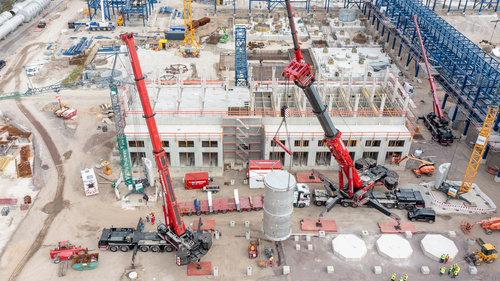
A new biorefinery in Leuna, Germany, is being constructed by UPM to produce sustainable glycols and lignin-based renewable functional fillers from wood. The biorefinery is expected to be operational by the end of 2023. The renewable glycols will be used in various industrial and consumer products, while the lignin-based fillers will be used as a sustainable alternative in rubber applications. These products can be integrated into existing production and recycling processes, contributing to the transformation of the chemicals value chain towards renewable circularity.
Once operational, the new biorefinery in Leuna, Germany, will ramp up to turn wood into next-generation biochemicals producing sustainable glycols and lignin-based renewable functional fillers. After the groundbreaking in 2020, the construction of the UPM biorefinery is in full swing. We estimate the technical start-up by the end of 2023.
The first milestone is the completion of the pipe rack. Pulling the concrete for the fundaments is ongoing, and the first buildings are coming out of the soil.
UPM is investing in the biochemicals industry
The renewable Bio-Monoethylene Glycol (BioMEG) will serve as a base material for various industrial products and consumer goods, such as PET bottles, packaging materials, polyester textiles and engine & battery coolants.
The renewable Bio-Monopropylene Glycol (BioMPG) will be ready to be converted into cleaning agents, deicing fluids, fragrances, and cosmetics.
As they can be fully integrated into existing production and recycling processes, they enable the transformation of the entire chemicals value chain towards renewable circularity.
The lignin-based Renewable Functional Fillers (RFF) are a completely new, sustainable product and sustainable alternative to replace carbon black and precipitated silica in various rubber end uses such as tires, hoses, rubber floorings and scores of other rubber applications.